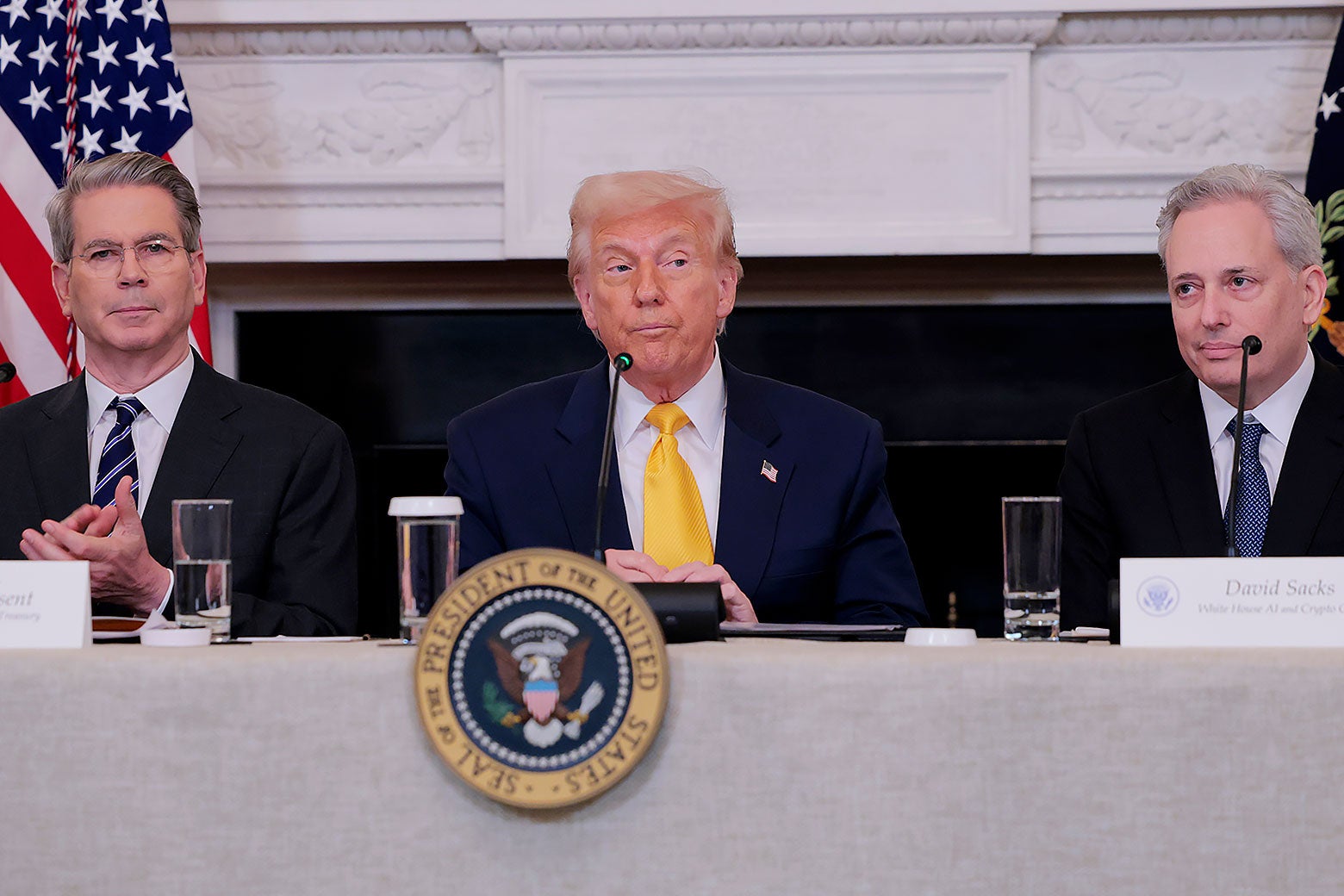Sign up for the Slatest to get the most insightful analysis, criticism, and advice out there, delivered to your inbox daily.
Crypto companies mounted one of the biggest influence-purchasing campaigns in American history in 2024. This week, a handful of Senate Democrats helped them recoup some return on investment.
The bill at issue is the GENIUS Act, the first federal effort to regulate stablecoins. Those are the crypto coins with values pegged 1-to-1 with another currency or asset—most commonly the U.S. dollar. On Monday, it cleared a cloture vote in the Senate, with 16 Democrats joining Republicans to push it toward passage. In a vacuum, the bill sets out several reasonable policy ideas. It would require crypto companies that issue stablecoins to hold liquid, safe reserves that they could use to cash customers out. In the event of a crypto business’s going bust, it would give stablecoin holders “first priority over any other claim” to get repaid. The bill, which is pretty long, also includes some money laundering rules.
The legislation’s challenge is that we do not live in a vacuum. The crypto industry has become a political behemoth, tossing around hundreds of millions of dollars in the hopes of dealing with crypto-friendly lawmakers. (These contributions have been bipartisan, but the industry’s heavy hitters increasingly favor conservative politics, and its clearest win in 2024 was a $40 million effort to replace Ohio Democratic Sen. Sherrod Brown with a crypto-adoring Republican, Bernie Moreno.) The GENIUS Act is the crypto lobby’s receiving some of what it paid for. Donald Trump himself is also using crypto generally—and stablecoins specifically—to turn a profit on his presidency and stands to win again if a stablecoin framework becomes law.
It’s a bill of contrasts. On the one hand, it’s an inoffensive-seeming regulatory bill. On the other, it gives crypto bosses exactly what they want and does a huge favor to the most famous businessman in crypto, who also happens to be the guy who would sign the bill from behind the Resolute Desk.
Crypto companies and executives did not fire the political money cannon expecting nothing in return. The industry has an expansive wish list for the government, and the Trump administration has fulfilled some of it with executive action. The president has pardoned high-profile crypto criminals, including Silk Road operator Ross Ulbricht. His Justice Department has disbanded its crypto enforcement team. And he issued an order to establish a crypto reserve, a stockpile that would, in theory, boost the market for the currency by introducing the richest buyer of all: the federal government. But there’s only so much Trump can do, and even that crypto reserve fell short of what a bitcoin investor might want.
In Congress, the industry settled on stablecoin regulation as its first big push. It’s surprising at first glance. Why would crypto want to push for its own regulation? The business wants to shed its reputation as reckless and speculative. Stablecoins offer a tidy brand shift: Here’s a product that’s thoughtful and consumer-focused. It has a history of bad actors who have sullied crypto’s good name by issuing stablecoins that turned out not to be stable. (Here’s an opportunity for the industry to show that it’s better than that and for Congress to give customers the confidence to seize their financial futures. Plus, it’s a chance for established companies to operate in a regulatory climate that might otherwise be tough for new competitors.)
Regulation has a patriotic angle, as a strong stablecoin system could be great for the dollar. And if you grant that crypto is never going away, as we do at Slate, you should want responsible regulation of it, and you should want people to hold digital assets that aren’t constantly threatening to nosedive in value. So many crypto products are seedy tools of speculation, but stablecoins aren’t speculative at all on their own. They merely match some other asset, and if that is the U.S. dollar, then great. Stablecoins are useful in international payments without requiring the roller coaster ride of many digital assets.
But they are also a gateway drug into the rest of crypto and a key facilitator for all sorts of crypto dealings. We could all just hold our dollars in, well, dollars, but the crypto industry would prefer we didn’t. Stablecoins exist on the blockchain, where they’re easy to exchange for other crypto assets and less likely to be pulled out of a crypto exchange and put into a bank. They’re great for quickly buying crypto, generating transaction fees in the process. They’re a mechanism for crypto borrowing and lending that isn’t subject to the ups and downs of, say, bitcoin. (Coinbase, for example, has a newish program that allows users to take out instant loans in dollarlike stablecoins so that they can go out and buy more crypto.) The industry would like to offer products like this with as little red tape as possible, and so it is delighted that this bill specifically notes that stablecoins aren’t “securities.” (Crypto executives used to fight a lot with Joe Biden’s Securities and Exchange Commission about this exact subject.)
The crypto industry is poised to make a lot of money by getting more people into stablecoins. So it is hoping for a regulatory bill that has a light touch—don’t launder money; make sure your customers can cash out when they wish—but most importantly lends confidence and legitimacy. The legislation’s provision to give special treatment to stablecoin holders when a company goes bankrupt is telling. You could just keep your dollars in dollars, and as long as they’re in a bank, the Federal Deposit Insurance Corporation will make sure you get it back. The crypto industry would prefer that you set aside that miracle of American engineering and hold stablecoins, which you’d now have a slightly better chance of getting back in the event that the company holding them for you goes under. It’s a solution to a problem that does not exist in traditional banking but that sometimes rears its head in crypto.
The bill would be less controversial if it did not stand to create a windfall for Trump, whose crypto ventures now include a stablecoin. The president’s self-dealing by way of crypto has outraged a lot of the ecosystem’s true believers, but not so much that anyone with any power in the industry has done anything to stop him from generating billions in paper value (and millions in very real transaction fees). Trump making an additional fortune by attaching his name to a meme coin is just one brand of cashing in on his celebrity and influence, and not even one that the president is unique in pursuing. Trump throwing gasoline on the stablecoin fire after he personally becomes a stablecoin issuer would be a much more novel form of corruption. Democrats noticed this and sought to insert Trump-specific prohibitions into the bill text. That did not succeed, given Republicans’ desire to shield Trump from even the vaguest idea that any of his crypto ventures might be inappropriate.
Sen. Elizabeth Warren was one of the Democrats who made note of this political problem with the bill. She opposes the GENIUS Act not just because of fears of a crypto “meltdown” but because the greasing of the stablecoin skids stands to help the president rake in more money from his position. More than a dozen of her Democratic colleagues were not persuaded, though. Mark Warner’s explanation of his support was that he had “very real concerns” about Trump’s enriching himself but that the regulatory policy in the bill was worth advancing it anyway. Warner called the legislation “a meaningful step forward.”
Enough Democrats saw it Warner’s way to keep the bill moving. One effect of the stablecoin bill, if it becomes law, will be to put some sensible rules in place to govern a massive part of crypto that will never go away. An additional effect will be to reward an industry that tried to purchase multiple branches of government and is now seeing substantial ROI. And a third will be to grant Trump another enormous score, only this one will have been made possible by at least a handful of Democratic votes.










